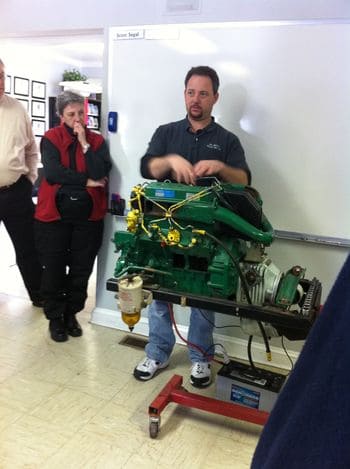 Had a great weekend down at the Annapolis School of Seamanship, taking their Basic Diesel course. For those of you who have followed this blog for a while, you will know that I have a mistrust, nay a loathing of engines. Why? Well, truth be told, I just don’t know the first thing about them. Put it this way, a friend asked me recently how many cylinders my engine had and I stared at him embarassed and said 3 or 4.
Had a great weekend down at the Annapolis School of Seamanship, taking their Basic Diesel course. For those of you who have followed this blog for a while, you will know that I have a mistrust, nay a loathing of engines. Why? Well, truth be told, I just don’t know the first thing about them. Put it this way, a friend asked me recently how many cylinders my engine had and I stared at him embarassed and said 3 or 4.
Now that we are in possession of a boat with a large’ish Diesel engine (a Westerbeke 33HP), I figured it was time to learn how the damn things work. I found the Annapolis School of Seamanship online and I figured, that they had a nice web site, a great name and a nice-looking 2-day course on marine diesel engines so I signed up.
It did not disappoint. In fact, it was one of the best courses I have taken. They break the course down into four well-structured modules, mixing up how marine diesel engines work, taking an engine apart, trouble-shooting, hands-on fixing stuff and problems-solving. They also provided Nigel Calder’s Marine Diesel Engines as course reading material.
The two instructors were excellent: John, a very experienced skipper provided the operator”s perspective and Scott (pictured here), a professional mechanic brought more-in-depth knowledge. Scott had a permanent patient but slightly weary look on his face and John had some great stories often about cock-ups he had been involved in. This format worked well.
The class of 16 were mostly experienced sailors and motor-boaters who made for a good discussion, great questions and some good break-time chatter about boats and places to sail.
Twenty five pages of notes later and a permanent smell of diesel on my hands, I have gone from clue-less to having a clue. Certainly not an expert and I will no doubt forget most of what I learned before the season starts but I feel like I have an platform to build on. Well, at least when I write checks to fix stuff in future I will know what I am paying for. Hey, who knows I might even fix some stuff myself.
PS: The subject of this post is how you remember the stages of a 4-stroke engine, i.e. air is sucked into the cylinder then squeezed (compressed), heating it up; as fuel is injected into the compressed and hot air it goes bang (combustion) and out is blows (exhausts).

I SO need to attend one of those classes. One thing though, I have changed the oil and filter before 🙂
Show-off!
I will say, however, that hot engine oil is easier to extract than warm!
Interesting, that’s exactly what hey said on the course, i.e warm it up first
I find wiping off engines with a rag gives me a feeling of accomplishment. The thing LOOKS better, so surely it must feel better about itself, and therefore will reward me with better performance. Also, mechanics appreciate it.
It’s actually an important thing to do. Less likely that crap will get in the engine and also makes it easier to see what’s going on.
I took one of these courses a few years ago and the most valuable lesson I learned was how to find a good mechanic – I now use the guy who taught the course.
Interestingly the guy above handed out is biz card to all. Only useful if your in the Annapolis area.
the key thing is being able to recognize a GOOD mechanic. Worth their weight in gold.